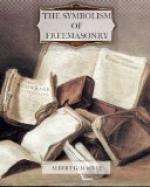In all of these, as well as in Freemasonry, darkness is the symbol of initiation not complete.
DEATH. Because it was believed to be the entrance to a better and eternal life, which was the dogma of the Mysteries, death became the symbol of initiation; and hence among the Greeks the same word signified to die, and to be initiated. In the British Mysteries, says Davies (Mythol. of the British Druids), the novitiate passed the river of death in the boat of Garanhir, the Charon of the Greeks; and before he could be admitted to this privilege, it was requisite that he should have been mystically buried, as well as mystically dead.
DEFINITION OF FREEMASONRY. The definition quoted in the text, that it is a science of morality, veiled in allegory and illustrated by symbols, is the one which is given in the English lectures.
But a more comprehensive and exact definition is, that it is a science which is engaged in the search after divine truth.
DELTA. In the higher degrees of Masonry, the triangle is so called because the Greek letter of that name is of a triangular form.
It is a symbol of Deity, because it is the first perfect figure in geometry; it is the first figure in which space is enclosed by lines.
DEMETER. Worshipped by the Greeks as the symbol of the prolific earth. She was the Ceres of the Romans. To her is attributed the institution of the Eleusinian Mysteries in Greece, the most popular of all the ancient initiations.
DESIGN OF FREEMASONRY. It is not charity or alms-giving.
Nor the cultivation of the social sentiment; for both of these are merely incidental to its organization.
But it is the search after truth, and that truth is the unity of God, and the immortality of the soul.
DIESEAL. A term used by the Druids to designate the circumambulation around the sacred cairns, and is derived from two words signifying “on the right of the sun,” because the circumambulation was always in imitation of the course of the sun, with the right hand next to the cairn or altar.
DIONYSIAC ARTIFICERS. An association of architects who possessed the exclusive privilege of erecting temples and other public buildings in Asia Minor. The members were distinguished from the uninitiated inhabitants by the possession of peculiar marks of recognition, and by the secret character of their association. They were intimately connected with the Dionysiac Mysteries, and are supposed to have furnished the builders for the construction of the temple of Solomon.




